 Petzlover
Petzlover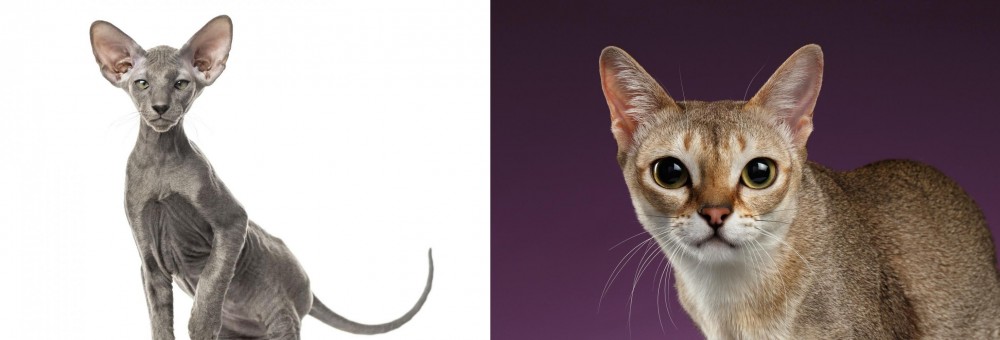 Peterbald is originated from Russia but Singapura is originated from Singapore. Both Peterbald and Singapura are having almost same weight. Both Peterbald and Singapura has almost same life span. Both Peterbald and Singapura has almost same litter size. Peterbald requires Moderate Maintenance. But Singapura requires Low Maintenance
Peterbald is originated from Russia but Singapura is originated from Singapore. Both Peterbald and Singapura are having almost same weight. Both Peterbald and Singapura has almost same life span. Both Peterbald and Singapura has almost same litter size. Peterbald requires Moderate Maintenance. But Singapura requires Low Maintenance
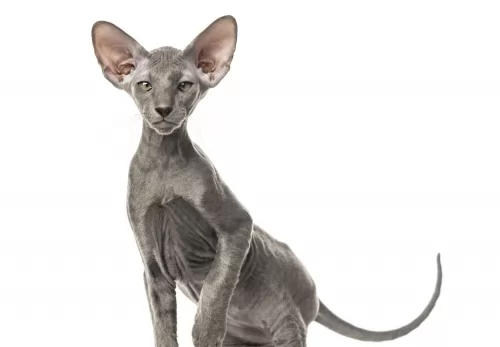 As a newer and rare cat breed, the Peterbald cat’s history is somewhat limited.
As a newer and rare cat breed, the Peterbald cat’s history is somewhat limited.
The breed was first developed in 1994, when a Russian breeder named Olga S. Mironova crossed an Oriental Shorthair cat with a Don Sphynx cat. This cat was to be known as the Peterbald.
The Peterbald cat is recognized by the Cat Fanciers Association. It was also accepted by The International Cat Association in 1997.
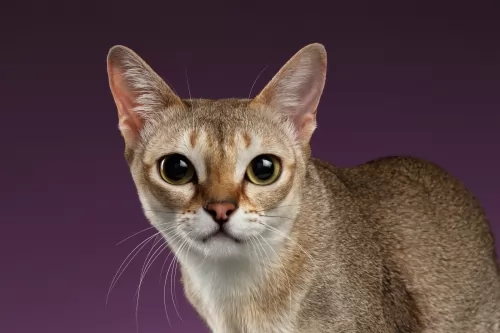 There are conflicting stories surrounding the origination of the Singapura. It does seem however, that natural Singapurans were found in Singapore.
There are conflicting stories surrounding the origination of the Singapura. It does seem however, that natural Singapurans were found in Singapore.
The first documented account was of a cat known as Chiko who was found in a Singaporean SPCA in 1980 by Sheila Bowers and WA Brad.
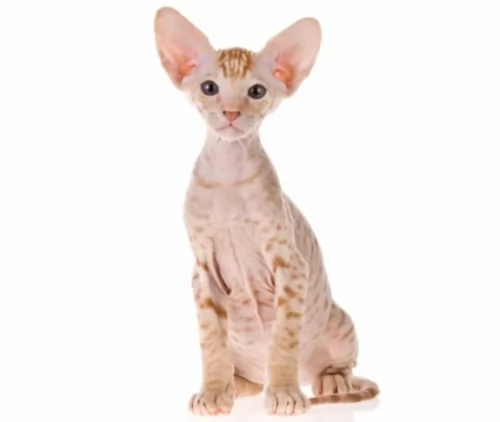 Looking a little bit futuristic, with a long, narrow head, almond-shaped eyes and large, pointed ears, the medium-sized, slimly built Peterbald cat can weigh between 3 and 6kg and is essentially a hairless cat.
Looking a little bit futuristic, with a long, narrow head, almond-shaped eyes and large, pointed ears, the medium-sized, slimly built Peterbald cat can weigh between 3 and 6kg and is essentially a hairless cat.
Although Peterbalds are considered a cat breed that are essentially hairless, not all of them are hairless as there are some that have a very short coat. There are some that are born with quite a bit of hair but they lose this.
In fact, their coat color as well as certain markings can be in various shades and patterns.
Peterbalds are easy-going, social cats with a sweet nature. They are affectionate towards their human companions and are quite vocal too, liking to talk to their owners. They are active and playful and enjoy playing with children and even other pets in the home.
In fact, they are adaptable cats and will slot into different home environments and lifestyles. The hairless variety is best as an indoor cat and this is why they suit living in apartments as well.
They are independent and intelligent, and people who have owned them say their pets often behave like a dog, wanting to be involved in their human's activities.
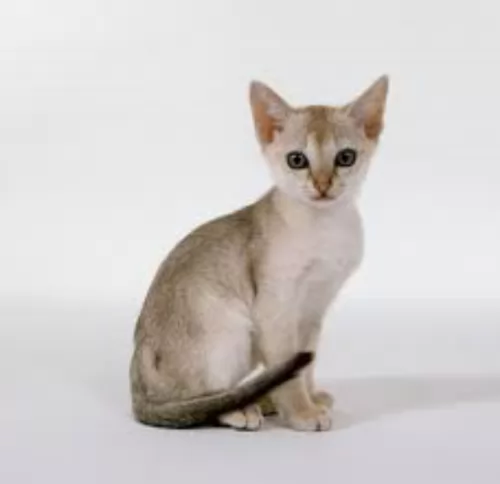 The Singapura cat is small in size, not weighing more than 2, 3 or 4kg. This short-haired, ivory-colored coat has brown ticking.
The Singapura cat is small in size, not weighing more than 2, 3 or 4kg. This short-haired, ivory-colored coat has brown ticking.
The cat is a natural breed and is muscular and strong. It is actually the smallest of the domestic cats. The cat has big ears, large green or yellowish eyes and is often referred to as ‘Pura’.
While the Singapura looks like a small, finely boned cat, when you pick him up, you discover that he is actually deceivingly heavy. The cat has slender legs with the back legs being slightly longer than the front legs. The tail ends with a recognizable black tip.
The Pura is intelligent and inquisitive and loves leaping onto high surfaces to explore. They then love to come bounding down and to land in one of his family member’s laps. This cat is a bundle of energy and playfulness. You'll need to invest in toys for your fun-loving Pura who loves nothing more than to be playing with soft little balls or scampering after a toy-mouse.
He is social and extroverted and gets along well with children and dogs in the house. He isn’t as vocal as some of the other cat breeds and actually has a quiet voice. The Singapura cat personality is outgoing, active and inquisitive and full of tricks and he is always ready to join in with any games.
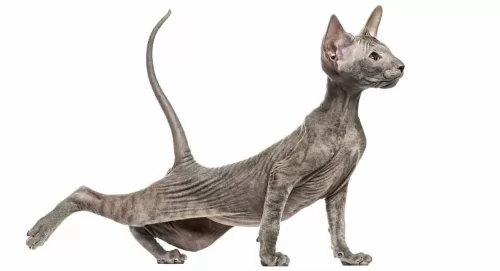 These Peterbalds are very intelligent cats and also very affectionate with their human owners. They are always up for a game and are playful and social.
These Peterbalds are very intelligent cats and also very affectionate with their human owners. They are always up for a game and are playful and social.
While they make excellent family pets and companions, one just has to take special precautions with the hairless variety and ensure that they don't become too hot or too cold.
They’re balanced in nature and adapt to the different human personalities in the household as long as its human owners are kind and respectful towards animals. With the right level of love, kindness and respect, they become ideal companions.
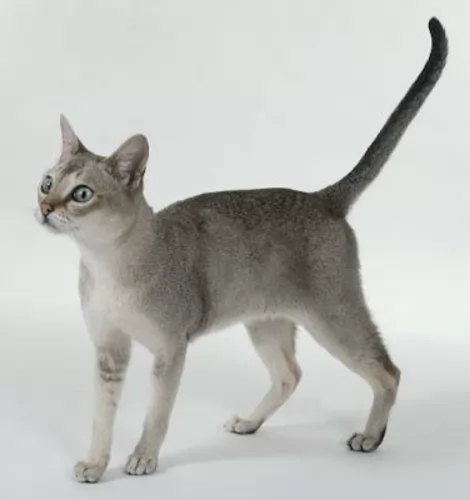 Singapuras make awesome pets and with all their energy and antics they provide hours of entertainment. They are intelligent, energetic, and playful. The people who have them say they become your best friend because they are cats that are sensitive to the moods of their human owners.
Singapuras make awesome pets and with all their energy and antics they provide hours of entertainment. They are intelligent, energetic, and playful. The people who have them say they become your best friend because they are cats that are sensitive to the moods of their human owners.
Dynamite comes in small packages, and that’s exactly what you get when you bring the small Singapura cat into your home and life.
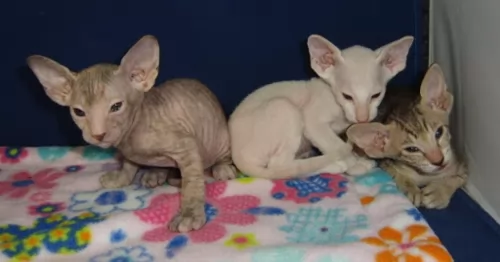 One of the more obvious things to watch out for with this particular cat is his hairlessness. This means he is more susceptible to the cold as well as to the heat. If he is outdoors, you have to be careful with his skin as it could get burned. Rough play with children could also cause scratching of the sensitive skin.
One of the more obvious things to watch out for with this particular cat is his hairlessness. This means he is more susceptible to the cold as well as to the heat. If he is outdoors, you have to be careful with his skin as it could get burned. Rough play with children could also cause scratching of the sensitive skin.
This particular cat is a fairly new breed and so there are few genetically inherited problems to be careful of.
Their large ears might prove to be a problem, and you will need to check the interiors and see that they remain clean. Also, trim his claws. If you fear that you could hurt your cat while attempting to groom him, rather take him along to professional, reputable pet groomers or have your vet do these grooming processes for you.
Whenever your Peterbald is sick you will need to get him to the vet. As it is, as a kitten, he will need to be taken to the vet to have his regular vaccines to protect him from some of the deadly cat diseases there are.
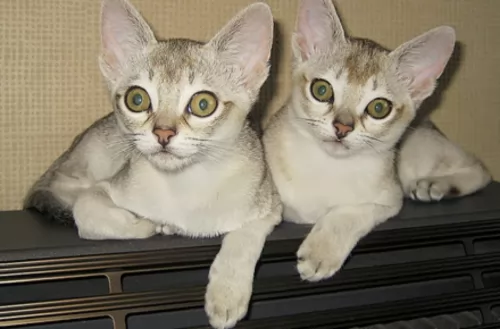 Your sweet Singapura cat has no particular genetic problems to deal with and also no specific health concerns. Although he is a generally healthy cat, one health condition that you want to be aware of is uterine inertia with the females.
Your sweet Singapura cat has no particular genetic problems to deal with and also no specific health concerns. Although he is a generally healthy cat, one health condition that you want to be aware of is uterine inertia with the females.
This particular condition was found in one of the foundation cats and still appears in some Singapura females.
Look after him well and return his love, and health issues will remain low. Having said that, every cat breed can develop health problems, and it pays to understand some of the more common cat illnesses.
Feline Lower Urinary Tract Disease is something that both male- and female cats can get. Watch that your Singapura doesn’t become overweight or unfit because this disease often occurs in cats who have become overweight.
Stress with a cat can also bring about this most uncomfortable disease in your cat. You’ll see your cat straining to urinate, he cries when urinating, and he isn’t his usual chirpy self. He may even have bloody urine. Get your pet to the vet immediately as not being able to urinate is an emergency.
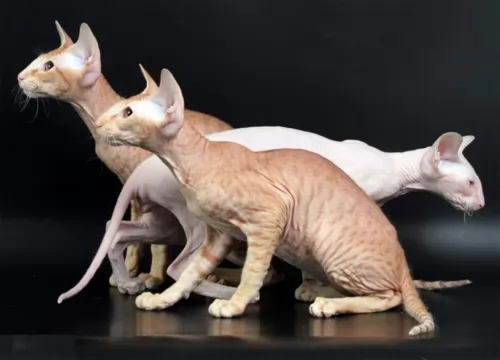 The Peterbald cat with its little or no hair is considered to be a low-maintenance cat. Their owners don’t have to worry about excessive shedding. Bathing these cats is important so that oils don't build up and cause skin irritation.
The Peterbald cat with its little or no hair is considered to be a low-maintenance cat. Their owners don’t have to worry about excessive shedding. Bathing these cats is important so that oils don't build up and cause skin irritation.
These cats are also best as indoor cats, but then again, some gentle sunshine on the skin will do him the world of good, and he loves the feel of the warm sun.
There are some Peterbald cat owners who gently bath their cats, sometimes once a week to get rid of the oil on the skin. If it isn’t possible to bath your cat, check out at your local vet as you do get special wipes for these cats that are effective in removing dirt and oil.
Also, speak to your vet about skincare and the possibility of moisturizing creams specially made for these cats and which are gentle and non-toxic.
This is a slim, athletic cat, and like all other cats, you have to be careful about weight issues. Any amount of weight with this cat can bring on a host of health issues such as extra pressure on the joints, not to mention other weight-related diseases such as diabetes and heart disease.
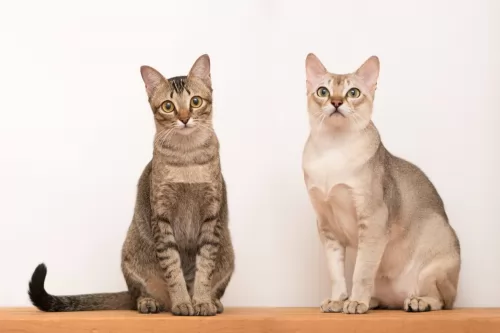 Your Singapura cat’s short coat is easy to groom. Brush your pet every week to remove the loose hairs and to also keep the coat sleek and shiny.
Your Singapura cat’s short coat is easy to groom. Brush your pet every week to remove the loose hairs and to also keep the coat sleek and shiny.
Every cat is a carnivore. Singapuras need meat if you want to avoid your cat getting some of the cat health problems there are. Singapura’s digestive system isn’t designed for foods that humans eat.
He will need high-quality food to ensure his ongoing good health. If you are going to feed your Singapura commercially packaged foods, take a good look at the ingredient list and make sure that meat and protein is at the top of the list.
Always buy age-appropriate food. You can imagine that a tiny kitten’s food requirements will be very different to that of an adult cat.
A kitten will require at least 3 or 4 meals a day. It is always a good idea to consult your vet for suggestions on what brand- and type of food to give your kitten and your adult Singapura.